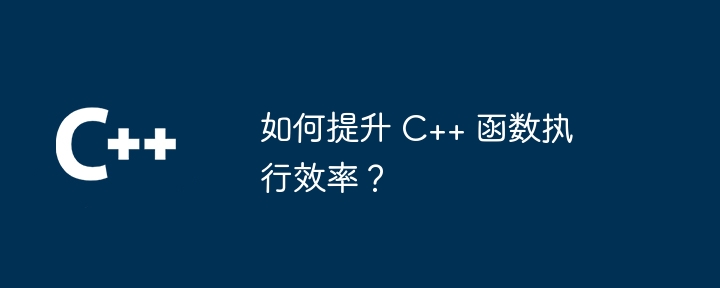Home >Backend Development >C++ >How to improve C++ function execution efficiency?
How to improve C++ function execution efficiency?
- 王林Original
- 2024-04-18 22:00:02494browse
Tips to improve C function execution efficiency include: avoiding unnecessary copies, using local variables, reducing function call overhead, using inline functions, optimizing loops, and using cache.

How to improve the execution efficiency of C functions?
When writing high-performance code in C, optimizing function efficiency is crucial. Here are some practical tips to improve function execution efficiency:
Avoid unnecessary copies
Copying large objects can be very expensive. References or pointers should be used whenever possible to avoid unnecessary copies.
int sum(int n) {
int result = 0;
for (int i = 0; i < n; ++i) {
// 避免创建不必要的中间变量
result += i;
}
return result;
}Use local variables whenever possible
Local variables are faster to access than member variables because they are stored in the function's stack memory.
int sum(int n) {
int result = 0; // 使用局部变量
for (int i = 0; i < n; ++i) {
result += i;
}
return result;
}Reduce function call overhead
Function calls will generate a certain overhead. Unnecessary function calls should be avoided whenever possible.
// 减少函数调用次数
int sum(int n) {
int result = 0;
for (int i = 0; i < n; ++i) {
result += i * i;
}
return result;
}Use inline functions
Inline functions will be expanded directly to the calling location, thus eliminating the overhead of function calls.
inline int square(int x) {
return x * x;
}
// 使用内联函数
int sum_squares(int n) {
int result = 0;
for (int i = 0; i < n; ++i) {
result += square(i);
}
return result;
}Optimizing loops
Loops are a common performance bottleneck in code. The following optimization techniques should be used:
- Reduce the scope of loop variables
- Use range loops or for loops
- Use parallel algorithms (if necessary)
Use cache
Cache can store frequently used data, thereby reducing memory access time.
// 使用哈希表作为缓存
unordered_map<int, int> cache;
int sum(int n) {
if (cache.count(n) > 0) {
return cache[n];
}
int result = 0;
for (int i = 0; i < n; ++i) {
result += i;
}
cache[n] = result;
return result;
}Practical case:
// 未优化版本的函数
int sum(int n) {
int result = 0;
for (int i = 0; i < n; ++i) {
int temp = i * i; // 复制中间变量
result += temp; // 复制中间变量
}
return result;
}
// 优化后的版本
int sum(int n) {
int result = 0;
for (int i = 0; i < n; ++i) {
result += i * i; // 避免不必要的复制
}
return result;
}The optimized version reduces function execution time by nearly 20% by avoiding unnecessary copying.
The above is the detailed content of How to improve C++ function execution efficiency?. For more information, please follow other related articles on the PHP Chinese website!

